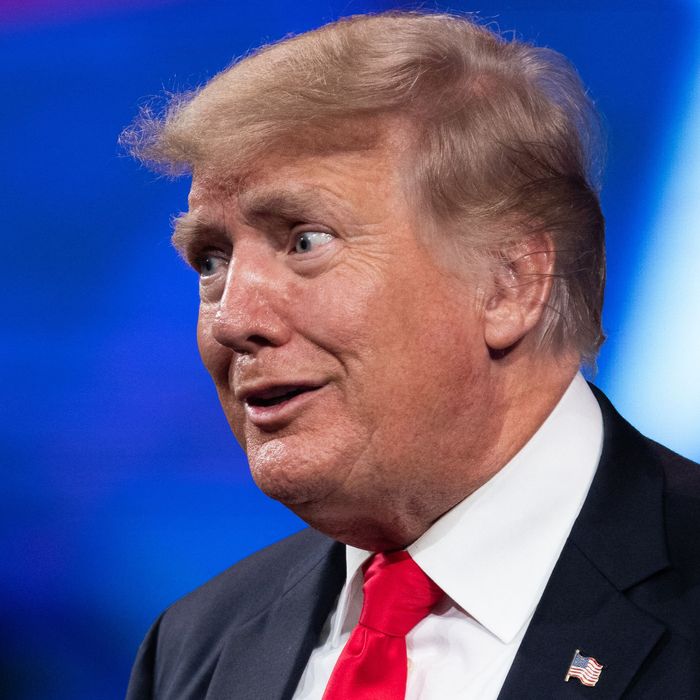
When Bob Woodward first breathlessly reported the fragile mental state of a president on his way out of office, it was a national sensation. His and Carl Bernstein’s depiction of a drunk, unhinged Richard Nixon in 1976’s The Final Days shocked the country in an age of three television networks and zero social-media platforms. In Woodward’s new book, Peril, co-authored with fellow Washington Post reporter Robert Costa, it’s no surprise that Trump is depicted as off his rocker — that’s been reported in detail almost every day for years, and regularly demonstrated by the former president’s own statements and behavior.
There are some novel details in the new book. While it was previously reported that Mark Milley, the chairman of the Joint Chiefs, thought Trump preached “the gospel of the Führer,” that Milley had sought to reassure his Chinese counterpart that Trump was not planning to launch a sudden military strike against the People’s Republic of China was new. The top U.S. general reportedly even went so far as to urge the cancellation of military exercises that he feared would fuel Chinese paranoia in the aftermath of the January 6 attack on the Capitol. (The details as originally excerpted fueled a media furor around Milley by implying he had gone rogue.)
The irony of course was that Trump never contemplated bombing China. Instead, he was focused on other issues like his displeasure with the design of the U.S.S. Gerald R. Ford aircraft carrier. In particular, according to Peril, Trump found the placement of the flight command center on the carrier’s deck to be aesthetically displeasing and would rail against it to military officials.
Yet while Trump was not interested in starting World War III, he was actively trying to overturn the results of the 2020 election. There are a few new details in Peril on the games those around Trump played as they’d tried to manage him in the aftermath of the election, like how Secretary of State Mike Pompeo got on the phone with Milley one evening to express the need for the two to act in concert to protect the country. “We’ve got to stand shoulder to shoulder,” he told the general. “We’re the last of the Mohicans.” (The next day, Pompeo was smirking to reporters about a “smooth transition to a second Trump administration.”) Mitch McConnell reportedly went so far as to set up a back channel to communicate with Joe Biden after the election to avoid a direct phone call that would raise Trump’s ire.
Throughout, Trump was an object of scorn for many in his orbit. Woodward and Costa report that Milley thought that the president was experiencing mental decline, Attorney General William Barr compared him to a deranged character from Dr. Strangelove, and McConnell was fond of telling senators a story that ended with the punchline of former secretary of State Rex Tillerson calling Trump “a fucking moron.”
Trump only occupies half the book, though. The other half is a series of episodes from Joe Biden’s presidential campaign and a chronicle of Biden’s first days in the White House. It is a far more conventional tale than that of Trump’s final days. There are the inside-the-room details that one comes to expect from Woodward’s oeuvre. That includes mistakes Biden made during his campaign, like when he alienated Delaware congresswoman Lisa Blunt Rochester by taking her support for granted (a mistake quickly remedied). Or how Biden almost forgot to pledge to put a Black woman on the Supreme Court during the presidential debate before the South Carolina primary — one of the commitments he’d made to seal the crucial endorsement of Congressman Jim Clyburn (who apparently had to slip backstage to remind Biden of it during a commercial break).
Woodward and Costa also report that Biden believed that President Obama got rolled into sending more troops into Afghanistan in 2010 by a cabal that included both top military brass and then-Secretary of State Hillary Clinton, and Peril confirms the new president’s distaste for living in the White House, which he has compared to “a tomb.” The book additionally reconstructs, in painstaking detail, the Biden administration’s negotiations with Joe Manchin that earned the senator’s support for the American Rescue Plan Act, the $1.9 trillion spending bill passed in March.
But the book’s two halves don’t quite fit together. The transition from Trump to Biden is jarring. One president regularly livetweeted television shows, the other is occasionally grumpy in private about Morning Joe panels. Trump’s dysfunction is too well-known to be shocking, at this point, and it makes the reporting about Biden seem banal.
In 2018, an internet jokester tweeted a fake book excerpt about Trump’s alleged love for the Gorilla Channel, a makeshift television channel created by aides that only aired videos of apes fighting. Many people believed the excerpt and story were real. That Trump might be obsessed with watching gorillas fight didn’t seem that far-fetched compared to what was appearing on the front page of the New York Times or Washington Post most days.
Then again, the idea of a president egging on a mob to lay siege to the U.S. Capitol should have been as absurd as the idea of one spending 17 hours a day watching videos of gorillas slapping each other. It is what makes any behind-the-scenes look at Trump’s White House so ultimately unsatisfying. There are ample newly reported details in Woodward and Costa’s book, but the most shocking events during Trump’s last days in office didn’t happen in closed-door meetings or private conversations — they were broadcast live on cable television.
After all, it becomes hard to reveal that the emperor has no clothes when he’s spent half a decade tweeting that he’s naked.





























